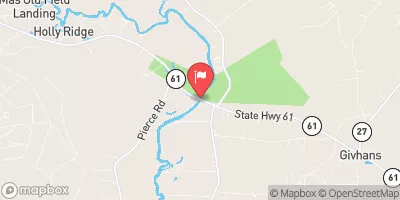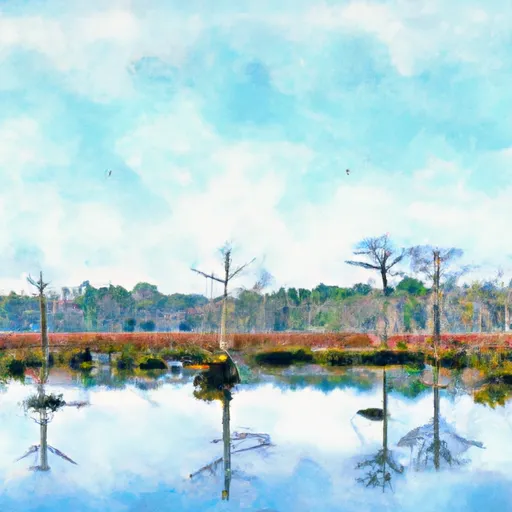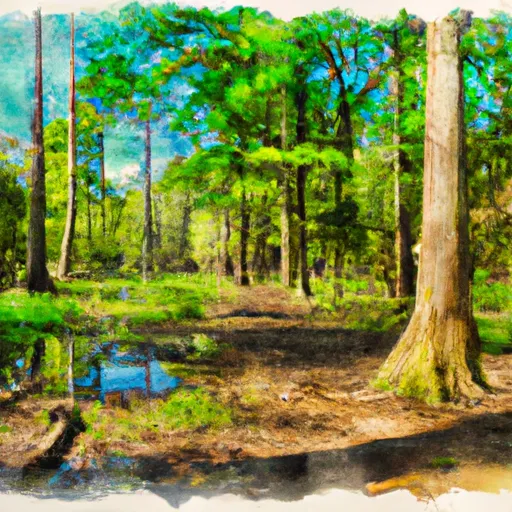Summary
This fishing area is known for its abundance of largemouth bass, bream, and catfish. Visitors can enjoy fishing from the shore or rent a boat to explore the pond's deeper waters.
There are many nearby activities to enjoy while visiting Gator Pond, including hiking, camping, and birdwatching. With its scenic views and tranquil waters, Gator Pond is the perfect retreat for nature enthusiasts and outdoor enthusiasts.
Some fishing tips for catching the prevalent species include using live bait such as worms or minnows for the bream and catfish. For the largemouth bass, try using topwater lures early in the morning or late in the evening when they are more active.
The best time of year to visit Gator Pond is in the spring or fall when the temperatures are cooler. The average temperature during these seasons is around 70-80 degrees Fahrenheit. During the summer, temperatures can soar into the 90s, making fishing less comfortable.
Overall, Gator Pond is a must-visit fishing destination for anyone looking to catch a variety of fish species while enjoying the beauty of the great outdoors.
°F
°F
mph
Wind
%
Humidity
15-Day Weather Outlook
5-Day Hourly Forecast Detail
Nearby Streamflow Levels
 Back River At Dupont Intake Nr Kittredge
Back River At Dupont Intake Nr Kittredge
|
1160cfs |
 Lake Moultrie Tailrace Canal At Moncks Corner
Lake Moultrie Tailrace Canal At Moncks Corner
|
1350cfs |
 Santee River Nr Jamestown
Santee River Nr Jamestown
|
7190cfs |
 Turkey Creek Near Maryville
Turkey Creek Near Maryville
|
3cfs |
 Edisto River Nr Givhans
Edisto River Nr Givhans
|
4560cfs |
 Santee River Near Pineville
Santee River Near Pineville
|
631cfs |
Angling Safety Guidelines
Check local fishing rules, seasons, size limits, and license requirements to ensure legal and sustainable angling.
Handle Fish Responsibly
Use wet hands, minimize air exposure, and release fish gently to improve survival rates when practicing catch-and-release.
Choose the Right Gear
Match your rod, line, and tackle to the species and conditions to increase success and reduce unnecessary harm to fish.
Respect the Waterway
Avoid disturbing habitat, prevent bank erosion, and keep a safe distance from spawning areas to protect ecosystems.
Keep It Clean
Pack out all line, hooks, bait containers, and trash—discarded gear can injure wildlife and degrade waterways.

 Willow Hall Pond
Willow Hall Pond
 Lower Nebo Pond
Lower Nebo Pond
 Middle Nebo Pond
Middle Nebo Pond
 Upper Nebo Pond
Upper Nebo Pond
 Twin Ponds
Twin Ponds
 Radford Bates Dam
Radford Bates Dam
 Paradise Island Public Boat Landing
Paradise Island Public Boat Landing
 Palmetto Islands County Park
Palmetto Islands County Park
 Cape Romain Wilderness Area
Cape Romain Wilderness Area
 National Wildlife Refuge Francis Marion
National Wildlife Refuge Francis Marion
 Francis Marion National Forest Huger Recreation Area
Francis Marion National Forest Huger Recreation Area
 Wilderness Little Wambaw Swamp
Wilderness Little Wambaw Swamp